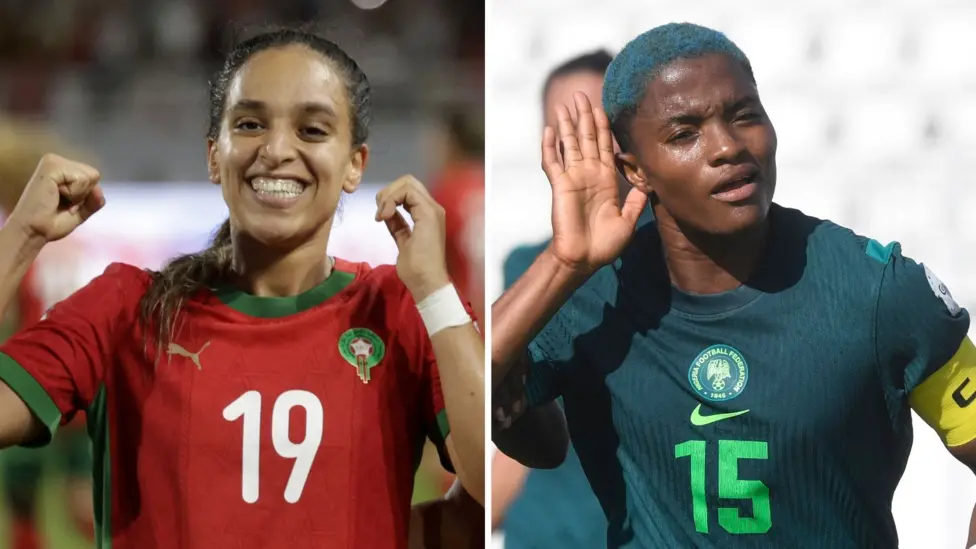All eyes will be on Rabat’s Olympic Stadium this Saturday as Nigeria’s Super Falcons lock horns with host nation Morocco in the 2024 Women’s Africa Cup of Nations (WAFCON) final. It’s a clash steeped in significance: Nigeria, the continent’s most decorated women’s team, are chasing a record-extending 10th title, while Morocco are bidding to make history by lifting the trophy for the first time.
Kick-off is at 20:00 GMT, and the stakes could not be higher.
Nigeria have been dominant throughout the tournament, conceding just once in five matches. Their semi-final victory over defending champions South Africa came courtesy of a stoppage-time winner from right-back Michelle Alozie, continuing their “Mission X” campaign — a slogan that symbolizes the squad’s drive to reclaim the crown last won in 2018.
“We’re born with the zeal to fight and win,” said forward Esther Okoronkwo. “We’ve grown as a team and shown that in every game.”
Under coach Justin Madugu, the Falcons have found the perfect balance between strength and style. Nine different players have scored so far, showcasing the team’s depth and versatility. Goalkeeper Chiamaka Nnadozie has barely been tested, conceding only from the penalty spot.
Morocco, meanwhile, are hoping to complete a fairy-tale run. The Atlas Lionesses, runners-up in 2022, are now one win away from becoming the first North African team to win the WAFCON title. Their semi-final win over Ghana came via penalties, and they’ve shown resilience throughout the tournament — coming from behind in multiple matches.
“We’ve seen a Moroccan team that doesn’t give up,” said Nigerian legend Desire Oparanozie. “They keep coming at you. That’s impressive.”
However, the hosts have looked more vulnerable than during their 2022 run. Goalkeeper Khadija Er-Rmichi has made notable errors, and star captain Ghizlane Chebbak — joint-top scorer with four goals — has struggled in the knockout stages. Winger Sanaa Mssoudy, expected to be a key creative outlet, has also failed to hit top form.
Despite this, Morocco have weapons of their own. Ibtissam Jraidi leads the line with pace and composure, and coach Jorge Vilda — the Spaniard who led his country to World Cup glory in 2023 — has been tasked with transforming individual talent into collective success.
Vilda’s appointment has been controversial due to his exit from the Spain job amid misconduct allegations surrounding former federation president Luis Rubiales. Still, he could make history by becoming the first coach to win continental titles with two different nations — and the first to lead Morocco to WAFCON glory.
“It’s a divided issue, but a win here would be transformative for women’s football in Morocco,” said journalist Maher Mezahi.
While Morocco aim to inspire a new generation, Nigeria are motivated by redemption. The Falcons were eliminated by Morocco in the 2022 semi-final after two red cards and a heartbreaking penalty shootout loss. This final offers the perfect chance for revenge.
“The pressure is on Morocco as hosts,” Oparanozie said. “But Nigeria is built for big moments. We’ve silenced home crowds before.”
Indeed, in 2016, the Super Falcons beat host Cameroon in front of 40,000 fans in Yaoundé — proof they can handle the pressure of a partisan stadium.
A win for Morocco would signal a shift in African women’s football and reward the nation’s vast investment in the women’s game. A Nigerian victory, meanwhile, would reinforce their legacy and reassert their dominance.
Saturday’s final isn’t just about a trophy. It’s about power, pride, and progress. One team will make history — either by confirming supremacy or by breaking new ground.
Let the battle for African glory begin.



